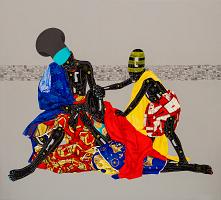MA
Race, Media and Social Justice
Content navigation menu
Why study MA Race, Media and Social Justice at Goldsmiths
How we live with difference is the key issue of our time. The MA Race, Media and Social Justice will equip you with critical and theoretical tools to unpack and deepen your understanding of contemporary debates on race, ethnicity and racism.
- Goldsmiths is a centre of pioneering critical race scholarship and you will be taught by leading figures in the field.
- You’ll examine a range of different theoretical and philosophical approaches to race and ethnicity, including postcolonial and critical race theories, poststructuralist approaches, and theories of intersectionality.
- The degree is underpinned by a focus on the cultural industries and you’ll learn to apply these theories to understand why representations of race and ethnicity take the shape that they do in news, film and social media.
- You’ll expand your practical and academic knowledge of diversity in the media and other sectors through a series of industry talks from Black, Asian and minority ethnic (BAME) practitioners working in the industry.
- This MA is taught across two departments – Media, Communications and Cultural Studies (MCCS) and Sociology – that are recognised as world-leading in their respective disciplines.
- As a postgraduate student you will join a thriving intellectual community at Goldsmiths, while learning the skills that you will be able to apply to a range of careers, from media, to policy, to charity/NGOs and other forms of social enterprise.
- Lead department – MCCS – has been ranked second in the UK for 'world-leading or internationally excellent' research (Research Excellence Framework, 2021) and 16th in the world (third in the UK) in the 2024 QS World Rankings for communication and media studies.
Contact the department
If you have specific questions about the degree, contact Akanksha Mehta.
Length
1 year full-time or 2 years part-time
Entry requirements
You should have (or expect to be awarded) an undergraduate degree of at least 2:1 standard in a relevant/related subject. You might also be considered if you aren’t a graduate or your degree is in an unrelated field, but you have relevant experience and can show you can work at postgraduate level.
Fees
Home - full-time: £11250
Home - part-time: £5625
International - full-time: £22000
Departments
What you'll study
Compulsory modules
All students take the following modules:
| Module title | Credits |
|---|---|
| Race Critical Theory and Social Justice | 30 credits |
| Race, Empire and Nation | 30 credits |
| Dissertation for MA Race, Media and Social Justice | 60 credits |
Note about optional modules (if available): The above is indicative of the typical modules offered, but is not intended to be construed or relied on as a definitive list of what might be available in any given year. The module content and availability is subject to change.
How you'll be assessed
Assessment consists of coursework, extended essays, reports, presentations, practice-based projects or essays/logs, group projects, reflective essays, and seen and unseen written examinations.
Entry requirements
You should have (or expect to be awarded) an undergraduate degree of at least upper second class standard in a relevant/related subject.
You might also be considered for the programme if you aren’t a graduate or your degree is in an unrelated field, but you have relevant experience and can show that you have the ability to work at postgraduate level.
International qualifications
We accept a wide range of international qualifications. Find out more about the qualifications we accept from around the world.
If English isn’t your first language, you will need an IELTS score (or equivalent English language qualification) of 6.5 with a 6.5 in writing and no element lower than 6.0 to study this programme. If you need assistance with your English language, we offer a range of courses that can help prepare you for postgraduate-level study.
How to apply
Apply directly to Goldsmiths using our online application system
Before submitting your application you’ll need to have:
- Details of your academic qualifications
- The email address of your referee who we can request a reference from, or alternatively a copy of your academic reference
- Copies of your educational transcripts or certificates
- A personal statement – this can either be uploaded as a Word Document or PDF, or completed online. Please see our guidance on writing a postgraduate statement
You'll be able to save your progress at any point and return to your application by logging in using your username/email and password.
When to apply
We accept applications from October for students wanting to start the following September.
We encourage you to complete your application as early as possible, even if you haven't finished your current programme of study. It's very common to be offered a place that is conditional on you achieving a particular qualification.
Late applications will only be considered if there are spaces available.
If you're applying for funding, you may be subject to an earlier application deadline.
Selection process
Admission to many programmes is by interview, unless you live outside the UK. Occasionally, we'll make candidates an offer of a place on the basis of their application and qualifications alone.
Find out more about applying.
Fees and funding
Annual tuition fees
These are the PG fees for students starting their programme in the 2025/2026 academic year.
- Home - full-time: £11250
- Home - part-time: £5625
- International - full-time: £22000
If your fees are not listed here, please check our postgraduate fees guidance or contact the Fees Office, who can also advise you about how to pay your fees.
It’s not currently possible for international students to study part-time under a student visa. If you think you might be eligible to study part-time while being on another visa type, please contact our Admissions Team for more information.
If you are looking to pay your fees please see our guide to making a payment.
Funding opportunities
First in Family Fee Waiver
The Department of Media, Communications and Cultural Studies will be awarding a limited number of competitive 100% fee waivers for the academic session 2025 – 26 for students who are the first in their family to attend university and who demonstrate considerable academic potential.
Find out more and apply for the First in Family Fee Waiver.
Explore the Goldsmiths scholarships finder to find out what funding you may be eligible for.
Paying your fees
Find out about how to make a payment.
If you are a UK student you may be eligible for a postgraduate loan.
Additional costs
In addition to your tuition fees, you'll be responsible for any additional costs associated with your course, such as buying stationery and paying for photocopying. You can find out more about what you need to budget for on our study costs page.
There may also be specific additional costs associated with your programme. This can include things like paying for field trips or specialist materials for your assignments. Please check the programme specification for more information.
Research
Critical race scholarship is one of the most active areas of research at Goldsmiths, and as a postgraduate student you will be immersed in the wide range of talks, research seminars and conferences that take place within the academic community here.
Events such as Are You Being Heard? on diversity in the media inform national policy debates on the future of the media.
Careers
Where your Masters could take you
The knowledge and skills you will graduate with from this degree will mean you are well-equipped to enter a diverse range of roles, particularly in relation to issues of equality, diversity and social justice. This could include governmental and public administration roles, NGO and charity work, policy work, and business and communications. Moreover, the emphasis on media will suit graduates interested in careers in creative and cultural industries.
You can read more about possible career options after you graduate on our careers page.
Skills
This degree will equip you with the ability to recognise and negotiate sensitive ethical issues in research and representation. You will also hone your ability to listen and speak to diverse audiences.
As a graduate from this degree you will develop excellent critical thinking and teamwork skills. The practical and research elements of the course will also equip you with the skills to design and implement projects. These transferable skills are highly valued by employers across many sectors.





.jpg)
